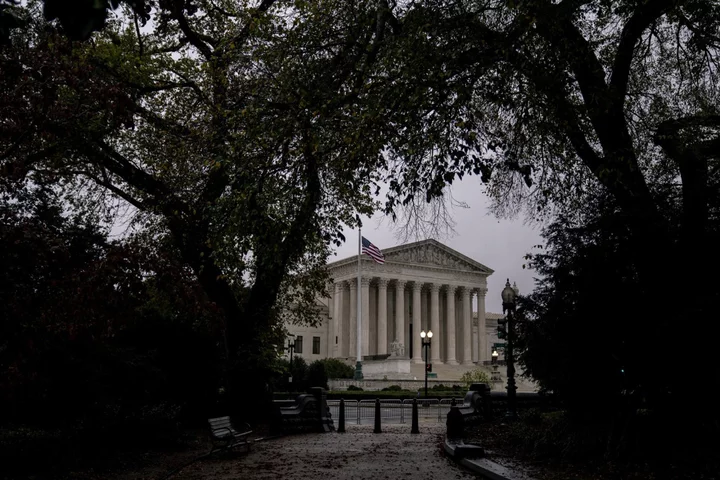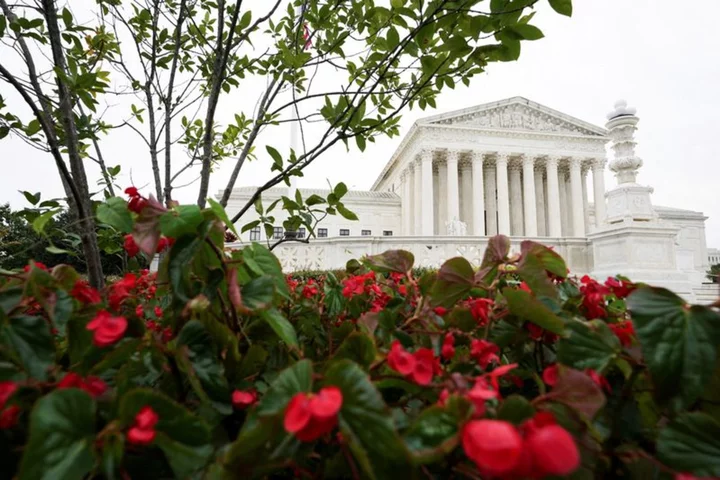More than 100 million people are under air quality alerts Friday from Wisconsin to Vermont and down to North Carolina, as smoke from Canadian wildfires continues to waft south, though conditions are expected to improve slowly into the weekend.
Storms on Thursday brought some relief from the smoke in parts of the Midwest, and more rain there Friday should provide more relief. But smoke may dissipate less quickly in the Ohio Valley and the Mid-Atlantic, where Friday's storms will be more isolated.
"Air quality is expected to improve in the short term as a combination of thunderstorm activity and dispersion of smoke will ultimately result in improving air quality conditions for much of the country heading into the weekend," the National Weather Service said.
More than 500 active wildfires raging across Canada have tanked the air quality across parts of that country and the US. As of early Friday, Toronto topped a list of the world's major cities with the worst air quality, followed by Washington, DC, according to IQAir.
Detroit, which topped the same list on Thursday evening -- ranked fourth early Friday, while New York City was sixth, the website showed.
On Friday, the United States' worst air quality is expected to span from Michigan to Ohio and into the Mid-Atlantic, including Washington, DC.
The air in those areas are expected to be rated "unhealthy for sensitive groups," a level 3 of 6, or "unhealthy," a level 4 of 6, on the US Air Quality Index developed by the Environmental Protection Agency. Current air quality ratings can be found on AirNow.gov, a partnership of agencies including the EPA.
"Unhealthy for sensitive groups" typically includes the elderly, young children, those with certain chronic illnesses and outdoor workers.
Elsewhere, New York Gov. Kathy Hochul announced Thursday that the statewide air quality health advisory will remain in effect through Friday, urging residents to take the necessary preventative measures -like masking- to stay safe outdoors.
"With ground-level smoke more visible and air quality continuing to reach unhealthy levels in many parts of the state, we encourage New Yorkers to take precautions to protect their health," Hochul said.
The western and central parts of New York along with the eastern Lake Ontario region are forecast to reach the "unhealthy" air quality threshold on Friday, the governor's office said. Other areas in the state could likely see air that's unhealthy for sensitive groups.
Canada Day fireworks in Montreal canceled
In Canada, Ontario, Quebec and British Columbia had some of that nation's worst air quality Thursday night, according to IQAir.
The impacts of the fires have prompted Canadian officials to cancel Canada Day fireworks in Montreal scheduled for Saturday, though other festivities are planned.
While forecasters weren't sure about Saturday's air quality, the cancellation decision was "in solidarity," said Stéphane Guertin, president of Tandem Communications, which was organizing the event.
"I am just being compassionate to what is going on right now. So that is why we are canceling it. It is a question of what is going on in the fires and what is in the air right now," Guertin told CNN.
"There is something bad happening now in the north of Quebec, so we are all together in this. So, it's been canceled. We are not going to put something more in the air."
Canada is experiencing its worst wildfire season on record, and scientists have been warning that such intense blazes are becoming more common as the planet warms.
Smoke from those massive flames can travel thousands of miles, putting millions more people in harm's way.
Wildfire smoke is particularly dangerous because it contains tiny particulate matter, or PM2.5, the tiniest of pollutants. When inhaled, it can move deep into lung tissue and enter the bloodstream.
It comes from sources including the combustion of fossil fuels, dust storms and wildfires. Such smoke has been linked to several health complications including asthma, heart disease and other respiratory illnesses.









